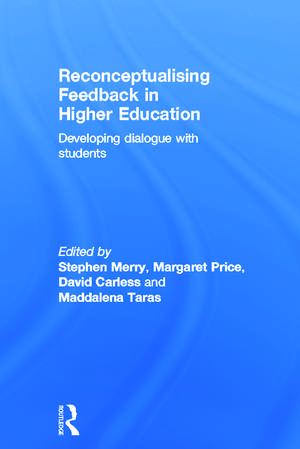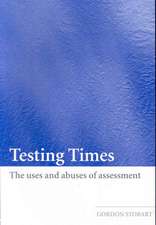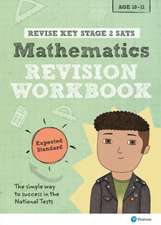Reconceptualising Feedback in Higher Education: Developing dialogue with students
Editat de Stephen Merry, Margaret Price, David Carless, Maddalena Tarasen Limba Engleză Hardback – 22 mai 2013
Student Surveys have indicated that feedback is one of the most problematic aspects of the student experience, and so particularly in need of further scrutiny. Current practices waste both student learning potential and staff resources. Up until now the ways of addressing these problems has been through relatively minor interventions based on the established model of feedback providing information, but the change that is required is more fundamental and far reaching.
Reconceptualising Feedback in Higher Education, coming from a think-tank composed of specialist expertise in assessment feedback, is a direct and more fundamental response to the impetus for change. Its purpose is to challenge established beliefs and practices through critical evaluation of evidence and discussion of the renewal of current feedback practices. In promoting a new conceptualisation and a repositioning of assessment feedback within an enhanced and more coherent paradigm of student learning, this book:
• analyses the current issues in feedback practice and their implications for student learning.
• identifies the key characteristics of effective feedback practices
• explores the changes needed to feedback practice and how they can be brought about
• illustrates through examples how processes to promote and sustain effective feedback practices can be embedded in modern mass higher education.
Provoking academics to think afresh about the way they conceptualise and utilise feedback, this book will help those with responsibility for strategic development of assessment at an institutional level, educational developers, course management teams, researchers, tutors and student representatives.
Preț: 765.01 lei
Preț vechi: 1027.89 lei
-26% Nou
Puncte Express: 1148
Preț estimativ în valută:
146.39€ • 156.54$ • 122.05£
146.39€ • 156.54$ • 122.05£
Carte tipărită la comandă
Livrare economică 17 aprilie-01 mai
Preluare comenzi: 021 569.72.76
Specificații
ISBN-13: 9780415692342
ISBN-10: 0415692342
Pagini: 240
Ilustrații: 4 tables
Dimensiuni: 156 x 234 mm
Greutate: 0.5 kg
Ediția:New.
Editura: Taylor & Francis
Colecția Routledge
Locul publicării:Oxford, United Kingdom
ISBN-10: 0415692342
Pagini: 240
Ilustrații: 4 tables
Dimensiuni: 156 x 234 mm
Greutate: 0.5 kg
Ediția:New.
Editura: Taylor & Francis
Colecția Routledge
Locul publicării:Oxford, United Kingdom
Public țintă
Academic, Professional, and Professional Practice & DevelopmentCuprins
Part I: Current thinking
Section A: The student voice 1 Surveys of ‘the student experience’ and the politics of feedback
2 Feedback – what students want
Section B: The wider picture - challenges to preconceptions
3 Feedback on feedback: uncrossing wires across sectors
4 Assessment feedback: an Agenda for Change
Section C: Principles and practices
5 Opening up feedback: teaching learners to see
6 Building ‘standards’ frameworks: the role of guidance and feedback in supporting the achievement of learnersPart II: Enhancing the student role in the feedback process
Section A: Students
7 Involving students in the scholarship of assessment: student voices on the feedback agenda for change
8 Feedback unbound: from master to usher
9 Feedback and feedforward: student responses and their implications
Section B: Tutors
10 Sustainable feedback and the development of student self-evaluative capacities
11 Students’ social learning practice as a way of learning from tutor feedback
12 Integrating feedback with classroom teaching: using exemplars to scaffold learning
Part III: Fostering institutional change
13 An assessment compact: changing the way an institution thinks about assessment and feedback
14 Fostering institutional change in feedback practice through partnership 15 Making learning-oriented assessment the experience of all our students: supporting institutional change
16 Achieving transformational or sustainable educational change
Section A: The student voice 1 Surveys of ‘the student experience’ and the politics of feedback
2 Feedback – what students want
Section B: The wider picture - challenges to preconceptions
3 Feedback on feedback: uncrossing wires across sectors
4 Assessment feedback: an Agenda for Change
Section C: Principles and practices
5 Opening up feedback: teaching learners to see
6 Building ‘standards’ frameworks: the role of guidance and feedback in supporting the achievement of learnersPart II: Enhancing the student role in the feedback process
Section A: Students
7 Involving students in the scholarship of assessment: student voices on the feedback agenda for change
8 Feedback unbound: from master to usher
9 Feedback and feedforward: student responses and their implications
Section B: Tutors
10 Sustainable feedback and the development of student self-evaluative capacities
11 Students’ social learning practice as a way of learning from tutor feedback
12 Integrating feedback with classroom teaching: using exemplars to scaffold learning
Part III: Fostering institutional change
13 An assessment compact: changing the way an institution thinks about assessment and feedback
14 Fostering institutional change in feedback practice through partnership 15 Making learning-oriented assessment the experience of all our students: supporting institutional change
16 Achieving transformational or sustainable educational change
Recenzii
"By emphasizing feedback as modelling classroom behaviour, practising reflective thinking and acknowledging the moral-ethical part of "humane teaching and assessment! (Merry et al. 2013, Foreword), the responsibility that it takes to provide feedback to learners and/or peers and the ability to judge quality (Sadler 2013), readers are given useful and specific guidelines for the teaching profession itself – outside the academia." – Szilvia Barta, University of Debrecen, The Hungarian Educational Research Journal.
Descriere
Feedback is a crucial element of teaching, learning and assessment. There is, however, substantial evidence that staff and students are dissatisfied with it, and there is growing impetus for change.
Reconceptualising Feedback in Higher Education, coming from a think-tank composed of specialist expertise in assessment feedback, is a direct and more fundamental response to the impetus for change. Its purpose is to challenge established beliefs and practices through critical evaluation of evidence and discussion of the renewal of current feedback practices.
Reconceptualising Feedback in Higher Education, coming from a think-tank composed of specialist expertise in assessment feedback, is a direct and more fundamental response to the impetus for change. Its purpose is to challenge established beliefs and practices through critical evaluation of evidence and discussion of the renewal of current feedback practices.









